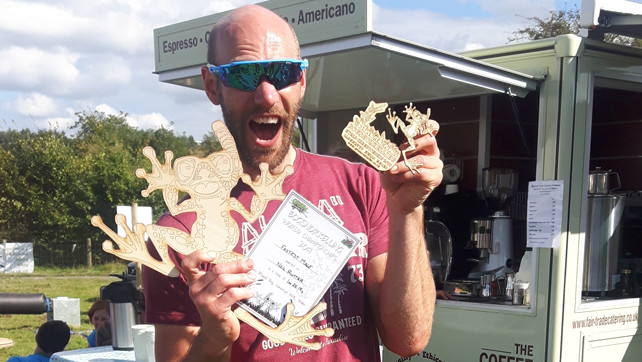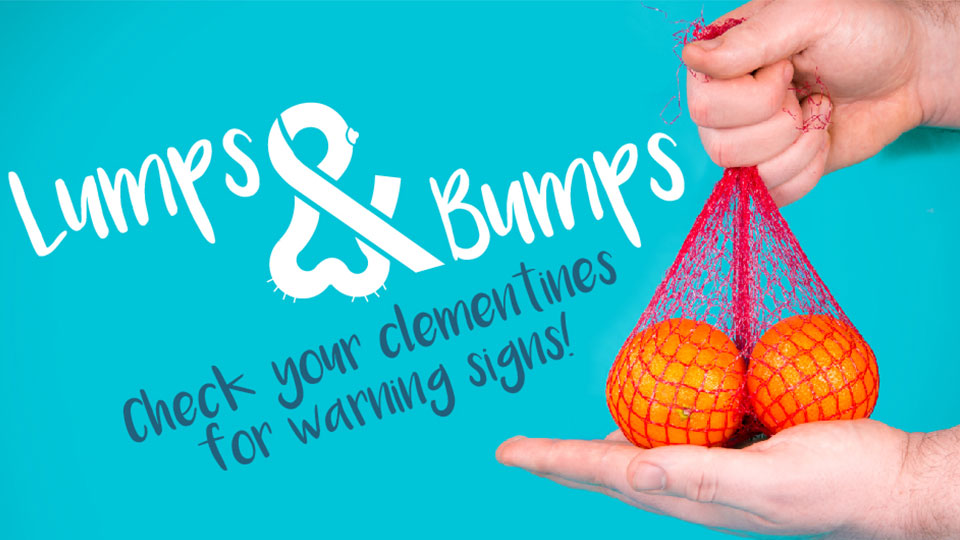12 Mar 2019
Lumps and Bumps: “Ultimately self-checking may have saved my life”
 Neil Rutter.
Neil Rutter.
Loughborough University alumnus Neil Rutter, who graduated in 2007 after studying Fine Art, is sharing his experience of testicular cancer in a bid to highlight the importance of the Lumps and Bumps event taking place next Wednesday (20 March).
Teacher Neil, who holds the Bog Snorkelling World Champion 2018 title, hopes his story will drive home how important it is to learn how to self-check and become familiar with your body.
What is your experience of testicular cancer?
I was initially diagnosed at 20 while in my first year at Loughborough University. I'd noticed occasional groin aches and had performed a self-check once a month since someone gave us a talk about it in Year 10 in secondary school.
I noticed a small, pea sized lump on my testicle while checking in the shower. I could only get an appointment with a female doctor at the GP and I felt a little uncomfortable baring all.
She couldn't feel what I could and said I was just feeling the epididymis. She could see I was concerned though and referred me to have a scan in six weeks’ time.
By the time of the scan, the lump had grown and there was more than one. From that point, everything happened very quickly.
The scan suggested it was sinister and following an Orchidectomy (removal of the affected testes) two days later, their biopsy confirmed it was cancer.
At that time, my oncologist presented me with good news: "There appears to have been no spread and it is contained to the testes we removed. You have a choice: we can give you two rounds of chemo now and virtually guarantee it won't return, or we can check you over each month and see if you stay clear. I would say you have an 80% chance it won't return."
Brazenly and with far more important things to be doing with my life than sitting in hospital being pumped full of poison, I opted for the second option.
Five months passed without a hiccup until I developed what I thought was a chest infection.
After two rounds of antibiotics, I thought I'd shifted it and returned to the pool for a swim training session.
Unable to breathe, I collapsed on poolside before I could complete the main set.
An x-ray revealed a large lump in my lung, quickly confirmed by a scan.
Again, everything kicked into action very quickly and within a couple of days I'd stored sperm, hit one last night with my friends at Hey Ewe and found myself facing three months of chemo (four rounds instead of the two I'd have had if I hadn't gambled).
The drug Etoposide was touted as something like a magic bullet in defeating a great number of cases and as part of a cocktail of two other drugs, I endured five-day stints in hospital receiving bag after bag.
After just the first round of chemo, the tumour in my lung had drastically reduced in size. I was no longer wheezing and already feeling better...and worse simultaneously.
Cancer drugs certainly have their side effects and it wasn't a pleasant time, but being young and fit, I didn't seem to suffer as much as many.
Ultimately, it was a life experience that to some degree has certainly shaped the person I have become.
I remain eternally grateful for the research that led to testicular cancer being so treatable and for my privileged position in being able to receive that treatment.
Why do you think it is important to self-check regularly?
If I hadn't checked myself, I would not have caught it until physical symptoms started to present themselves. If tumours had spread sufficiently far through my body, perhaps I wouldn't have received such a good prognosis. Check your balls boys!
What are your thoughts on what the Lumps and Bumps event is trying to achieve?
The only reason I checked myself was because of the awareness campaign at school. I went to a single-sex school and have no idea how many peers it resonated with.
Perhaps none, but on that day, something struck a chord with me and ultimately may have saved my life.
What advice do you have for staff and students of the University?
Twenty is far too young for cancer, right? I was fit, incredibly active, eating well (reasonably - it was uni after all).
Statistically, it affects young men, but few as young as 20. I've since met two other athletes who were a similar age when they developed the disease.
Cancer can affect anyone, at any time. It's massively important that we are body aware and responsible for our health.
Next week
The Lumps and Bumps event will run from 8am-8pm at multiple locations around campus. The aim is to train 1,001 people in breast and testicular self-examinations over the course of just one day.
More information can be found on the dedicated webpage and you can also hear about Sarah and Phil’s cancer journeys by visiting the YouTube Lumps and Bumps playlist.
Additional support
Staff affected by cancer, either personally or via a family member or friend, can seek support through the Employee Assistance Programme. Students are advised to contact Student Services for emotional support by popping into the Bridgeman Building or calling 01509 222765.
Those that are worried about their health can also visit the on-campus Medical Centre or call 01509 222061. Students must be registered as patients to access any necessary treatments.















